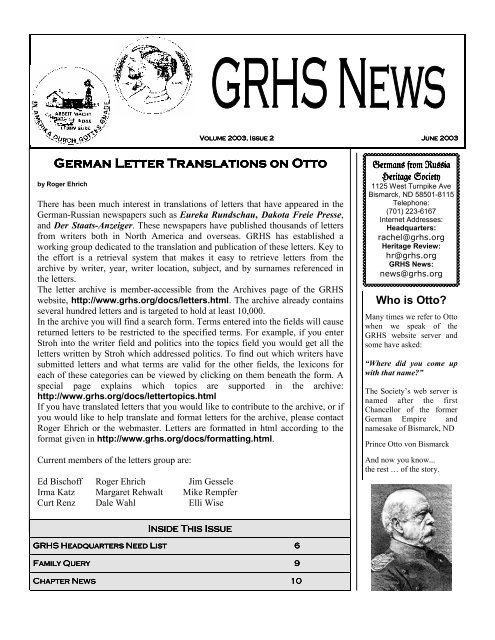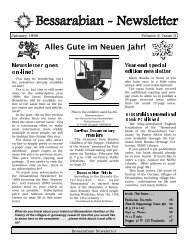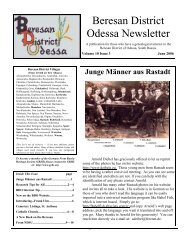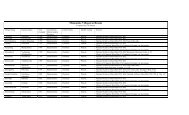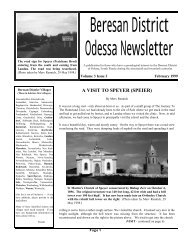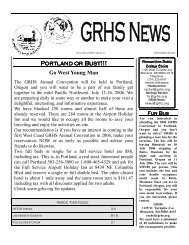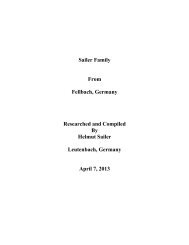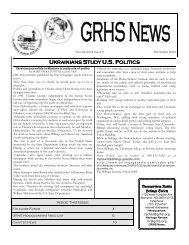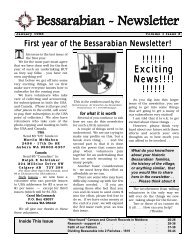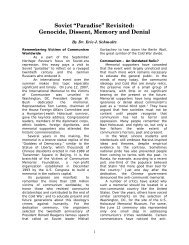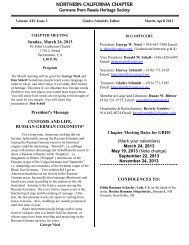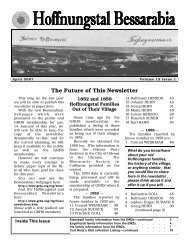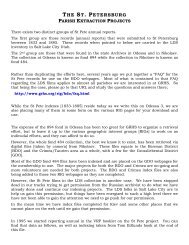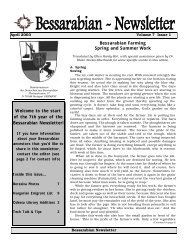Create successful ePaper yourself
Turn your PDF publications into a flip-book with our unique Google optimized e-Paper software.
German German Letter Letter Translations Translations on on Otto<br />
Otto<br />
by Roger Ehrich<br />
There has been much interest in translations of letters that have appeared in the<br />
German-Russian newspapers such as Eureka Rundschau, Dakota Freie Presse,<br />
and Der Staats-Anzeiger. These newspapers have <strong>pub</strong>lished thousands of letters<br />
from writers both in North America and overseas. <strong>GRHS</strong> has established a<br />
working group dedicated to the translation and <strong>pub</strong>lication of these letters. Key to<br />
the effort is a retrieval system that makes it easy to retrieve letters from the<br />
archive by writer, year, writer location, subject, and by surnames referenced in<br />
the letters.<br />
The letter archive is member-accessible from the Archives page of the <strong>GRHS</strong><br />
website, http://www.grhs.org/docs/letters.html. The archive already contains<br />
several hundred letters and is targeted to hold at least 10,000.<br />
In the archive you will find a search form. Terms entered into the fields will cause<br />
returned letters to be restricted to the specified terms. For example, if you enter<br />
Stroh into the writer field and politics into the topics field you would get all the<br />
letters written by Stroh which addressed politics. To find out which writers have<br />
submitted letters and what terms are valid for the other fields, the lexicons for<br />
each of these categories can be viewed by clicking on them beneath the form. A<br />
special page explains which topics are supported in the archive:<br />
http://www.grhs.org/docs/lettertopics.html<br />
If you have translated letters that you would like to contribute to the archive, or if<br />
you would like to help translate and format letters for the archive, please contact<br />
Roger Ehrich or the webmaster. Letters are formatted in html according to the<br />
format given in http://www.grhs.org/docs/formatting.html.<br />
Current members of the letters group are:<br />
Ed Bischoff Roger Ehrich Jim Gessele<br />
Irma Katz Margaret Rehwalt Mike Rempfer<br />
Curt Renz Dale Wahl Elli Wise<br />
Inside Inside This This Issue Issue<br />
Issue<br />
<strong>GRHS</strong> <strong>GRHS</strong> Headquarters Headquarters Need Need Need List List List<br />
6<br />
Family Family Query Query<br />
9<br />
Chapter Chapter <strong>News</strong><br />
<strong>News</strong><br />
Volume Volume <strong>2003</strong>, <strong>2003</strong>, Issue Issue 2 2<br />
<strong>June</strong> <strong>June</strong> <strong>2003</strong><br />
<strong>2003</strong><br />
10<br />
Germans Germans from from Russia<br />
Russia<br />
Heritage Heritage Society<br />
Society<br />
1125 West Turnpike Ave<br />
Bismarck, ND 58501-8115<br />
Telephone:<br />
(701) 223-6167<br />
Internet Addresses:<br />
Headquarters:<br />
rachel@grhs.org<br />
Heritage Review:<br />
hr@grhs.org<br />
<strong>GRHS</strong> <strong>News</strong>:<br />
news@grhs.org<br />
Who is Otto?<br />
Many times we refer to Otto<br />
when we speak of the<br />
<strong>GRHS</strong> website server and<br />
some have asked:<br />
“Where did you come up<br />
with that name?”<br />
The Society’s web server is<br />
named after the first<br />
Chancellor of the former<br />
German Empire and<br />
namesake of Bismarck, ND<br />
Prince Otto von Bismarck<br />
And now you know...<br />
the rest … of the story.
2<br />
<strong>GRHS</strong> <strong>GRHS</strong> <strong>News</strong> <strong>News</strong><br />
<strong>News</strong><br />
<strong>GRHS</strong> <strong>News</strong> Publishing Guidelines<br />
Items acceptable for <strong>pub</strong>lication:<br />
• Your stories - oral histories, Chapter histories<br />
• Chapter events and activities<br />
• Family search inquiries - Charges: Members, no charge; non<br />
members from overseas, no charge; non members from North<br />
America, membership in <strong>GRHS</strong><br />
• Folklore, folk medicine<br />
• Food recipes<br />
• Computer tips; genealogy computer program reviews<br />
• Book reviews<br />
• Items regarding the day to day operations of <strong>GRHS</strong>, its<br />
committees and Chapters<br />
Submission Deadlines:<br />
March issue - February 1 st<br />
<strong>June</strong> issue - May 1 st<br />
September issue - August 1 st<br />
December issue - November 1 st<br />
Submit items to the Editor via<br />
e-mail: news@grhs.org<br />
Postal mail: Randy Heinz<br />
810 Steffanich Dr.<br />
Billings, MT 59105 -2534 or <strong>GRHS</strong> HQ<br />
Have You Sent in Your Registration Yet?<br />
33rd Annual <strong>GRHS</strong> Convention<br />
September 4-7, <strong>2003</strong><br />
Ramkota Inn<br />
2111 LaCrosse St<br />
PO Box 1795<br />
Rapid City, SD 57709-1795<br />
Phone: 605-343-8550<br />
For more information visit:<br />
http://www.grhs.org/convention.html<br />
<strong>GRHS</strong> no longer accepts checks issued for anything<br />
other than U.S. funds. Checks issued in foreign<br />
currency will be returned to the sender. <strong>GRHS</strong> has<br />
always had this policy but because of the rising currency<br />
exchange rates we are now compelled to enforce it<br />
without exception.<br />
Thank you for your cooperation.<br />
<strong>2003</strong> <strong>2003</strong> Convention Convention Workshops<br />
Workshops<br />
Workshops<br />
• Archival Acquisition By Frances Feist & Curt Renz<br />
• At <strong>Home</strong> On The Russian Steppe And The Dakota Prairie By Shirley<br />
Wegner Nitschke<br />
• Beginning Computer By Judy Huber<br />
• Beginning, Intermediate & Advanced Computer Labs By Roger Ehrich,<br />
Judy Huber & Staff<br />
• But Grandma, I'm Bored - Using Today's Technology To Bring Your<br />
Heritage To Life By Tove Hoff Bormes, JD<br />
• Dedication Of The Gliickstal Monument By Margaret Freeman<br />
• Family Tree Maker - Part I -Exploring The Basics Of FTM By Val<br />
Ingram And David Kilwein<br />
• Family Tree Maker - Part 2 - Advanced Uses Of FTM: Charts, Books,<br />
Reunions By Val Ingram & David Kilwein<br />
• Genealogy: Researching Our German Russian Heritage By Gwen<br />
Pritzkau<br />
• German Dialects & The Language Of Our Ancestors<br />
• Germanic History Before 1850 - Why Did Our Ancestors Leave The<br />
<strong>Home</strong>land? By George Hoff<br />
• Germans From Russia - The Baby Boomer Generation - Passing The<br />
Heritage By Paulette Tobin<br />
• How 80 Years Of Communism Affected Ukraine - Transition From<br />
Soviet State To A Re<strong>pub</strong>lic By Inna Stryukova<br />
• Inside The <strong>GRHS</strong> - How Does This Huge Body Function? By Walt<br />
Rehling<br />
• Insights Into Life In The Soviet Union - Personal Experiences From<br />
Those Who Were There Panel Discussion<br />
• Intermediate Computer By Judy Huber<br />
• Letters From The <strong>Home</strong>land By Curt Renz<br />
• Maps & Information On Polish Settlements In 1793-1794 By Reuben<br />
Drefs<br />
• Meet Inna Stryukova An Informal Meeting With The Ukrainian<br />
Professor<br />
• Memorial - Rehabilitated By History - What Is Happening In The<br />
Ukrainian Archives? By Inna Stryukova<br />
• Religious Changes In Ukraine By Inna Stryukova<br />
• Strategy Meeting For Expanding Our Membership By Val Wangler &<br />
Del Beck<br />
• Technology In Action By Roger Ehrich<br />
• The Story Of Our Ancestors' Epic Journey - Part 1 By Gary Schorzman<br />
• The Story Of Our Ancestors' Epic Journey - Part 2 By Gary Sherman<br />
• The Story Of Our Ancestors' Epic Journey - Part 3 By Gary Schorzman<br />
• Today's German Russian In America -What About The Future? By Dr.<br />
Thomas Fricke<br />
• Village Group - Beresan Colonies Research By Valerie Ingram &<br />
David Kilwein<br />
• Village Group - Bessarabian Research By Dale Wahl<br />
• Village Group - Crimean Colonies Research By Wanda Hopkins<br />
• Village Group - Ghickstal Colonies Research By Margaret Freeman<br />
• Village Group - Grossliebental Colonies Research By Gayla Gray<br />
• Village Group - Hoffnungstal Research By Dale Wahl<br />
• Village Group - Kutschurgan Colonies Research By Robert Shuh<br />
• Village Group - North & South Caucasus Research By Bonnie<br />
Anderson<br />
• What Is Happening With The Clearing House Project By Dale Wahl<br />
• What's Happening With The Village Research Project By Dale Wahl<br />
• Where Do I Fit Into This Picture? - Helping Children Find Their Roots<br />
& Learn About Their Ancestors By Bonita Ley
A A A Hero's Hero's Hero's Flag Flag Flies Flies Over Over HQ<br />
HQ<br />
The U.S. flag which is currently being flown at <strong>GRHS</strong><br />
Headquarters is a flag donated to <strong>GRHS</strong> by Leo Bell in honor<br />
of his brother George Bell.<br />
George entered the U.S. Navy at Great Lakes, Illinois, on 7<br />
February 1940. He was transferred to the destroyer USS Buck<br />
on 1 May 1940, with the rank of AS. He was subsequently<br />
promoted to EM1 by December 1942.<br />
He served aboard the USS Buck, losing his life when the ship<br />
sank on 9 October 1943, near Salerno, Italy. Ninety-five of<br />
250 crewmembers survived. The ship sank as the result of a<br />
direct hit by an acoustic torpedo fired from the German<br />
submarine U 616.<br />
Ukrainian Ukrainian Professor Professor Professor to<br />
to<br />
Keynote Keynote Keynote Convention<br />
Convention<br />
Convention<br />
By Bob Schneider<br />
A Ukrainian university professor, Inna Stryukova, former<br />
head of the Foreign Language Department at the Agrarian<br />
University in Mykolayiv, will be a featured speaker and<br />
workshop presenter at the <strong>2003</strong> International <strong>GRHS</strong><br />
Convention in Rapid City. In addition to her career as a<br />
teacher, Inna has served as an interpreter for American and<br />
Canadian professors who lectured at the University, for<br />
businessmen, agricultural specialists who started the<br />
Extension Service for farmers in the Mykolayiv region, and<br />
for Christian missionaries. Inna holds a position as a senior<br />
teacher of English at the University. She is a member of the<br />
Board of Directors of the Ukrainian Christian Students<br />
Fellowship whose headquarters are in Kiev. Through her<br />
work as a translator, Inna has become friends with members<br />
of <strong>GRHS</strong>. She brings an interesting and exciting perspective<br />
to this Convention.<br />
Inna is familiar with Memorial, a human rights society, and<br />
their work in the former Soviet Re<strong>pub</strong>lics called<br />
“Rehabilitated by History”. In other words, she is<br />
knowledgeable about what is happening in the archives, and<br />
why being “rehabilitated” is important to the people whose<br />
relatives were “repressed”. She has lived in Ukraine during its<br />
transition from a Soviet Re<strong>pub</strong>lic to an independent state in<br />
the world, and understands the political, social, and economic<br />
changes that are taking place.<br />
The status of the land in Ukraine has always held questions of<br />
interest for Germans from Russia. Who owns the land in<br />
Ukraine now? What happened to the collective farms? Do the<br />
people living in the villages farm the land? Religion is<br />
another topic of interest to Germans from Russia. What is<br />
happening with the former churches in Ukraine? Is there a<br />
religious revival in Ukraine and Moldova? Inna Stryukova<br />
will address these questions, and provide a Ukrainian<br />
perspective that will make the <strong>2003</strong> International <strong>GRHS</strong><br />
Convention informative and interesting.<br />
<strong>GRHS</strong> <strong>GRHS</strong> <strong>News</strong> <strong>News</strong> 3<br />
Schoch Schoch Family Family History<br />
History<br />
Available Available Soon<br />
Soon<br />
In <strong>June</strong> of this year, “The Schoch Family History”, by Diane<br />
J. (Decker) Wandler will be <strong>pub</strong>lished. It will be going “to<br />
press” in the early part of <strong>June</strong> and will be done by the first<br />
part of July. If anyone is interested in this book as a member<br />
of the family or to share information for the book or in<br />
purchasing the book, please contact Diane very soon. The<br />
book is expected to have about 500 pages and lots of pictures,<br />
complete with a table of contents and an index.<br />
Some of the families included in this book will be: Schoch,<br />
Berger, Heidt, Emmil(Immel), Braunbeck, Frank, Friedrich<br />
(Freidig), Heidt, Hirsch, Huschka, Lantz (Lanz), Michel<br />
(Mischel), Miller, Reisenauer, Sticka, Wandler and Wanner.<br />
The immediate Schoch family lines that the book will be<br />
centered around are the Schoch’s who settled in the<br />
Dickinson/Schefield (St. Pius) area in southwest North<br />
Dakota. Some of the family moved out west to the Montana<br />
and Washington area.<br />
Some of the ancestral names are:<br />
Jakob and Gertrud (1st wife) Schoch, (2nd wife Katharina<br />
Reisenauer) Schoch from Malsch, Karlsruhe-Baden,<br />
Germany. Their son Jakob and Elizabeth (Lanz) Schoch from<br />
Karlsruhe, South Russia had these children: Cyriak, Joseph,<br />
Phillip, Marianna, and Katharina. Cyriak (Zyriak) Schoch and<br />
Katharina (Braunbeck) Schoch's son Anton Schoch married<br />
Isabella Berger. And that is the stem of this book. Isabella<br />
Berger was the daughter of Franz (Frank) and Rosa (Heidt)<br />
Berger who came from Landau, South Russia to North<br />
Dakota. And it goes on from there.<br />
Diane would appreciate hearing from anyone who fits into<br />
this family. If more information is needed, please contact her<br />
by email (preferably): dwandler@yahoo.com.<br />
Or snail mail address:<br />
Diane Wandler<br />
8601 Briardale Drive<br />
Bismarck, ND 58504, or phone 701-258-7874.<br />
FYI: FYI: New New New GG-R<br />
G R Website<br />
Website<br />
There is a new Germans from Russia web site on the Internet.<br />
It is<br />
http://14ushop.com/Krasna<br />
This web site is of particular interest to those who have a<br />
special interest in the villages of<br />
Krasna, Bessarabia, Russia,<br />
Emmental, Bessarabia, Russia,<br />
Karamurat, Dobrudscha, Romania, as well as a number of<br />
villages in the Dobrudscha region of Romania in which there<br />
were Roman Catholic Germans in residence.<br />
Check it out!
4<br />
Dear <strong>GRHS</strong> member,<br />
<strong>GRHS</strong> <strong>GRHS</strong> <strong>News</strong><br />
<strong>News</strong><br />
HFGR<br />
Heritage Foundation for Germans from Russia<br />
1125 W. Turnpike Ave.<br />
Bismarck, ND 58501 - 8115<br />
(701) 223 - 6167<br />
hfgr@attbi.com<br />
HFGR was organized, incorporated and its tax exemption [501(c)(3)] approved in 2001, to be the fund raising vehicle<br />
to support, among its other activities <strong>GRHS</strong> in a financial capacity.<br />
HFGR is NOT a part of <strong>GRHS</strong>; it operates independently with a separate eleven member Board of Directors selected<br />
from the <strong>GRHS</strong> membership with the sole purpose of receiving and managing monetary assets and to provide<br />
assistance to <strong>GRHS</strong> and related programs.<br />
HFGR has been referenced in the <strong>GRHS</strong> <strong>News</strong>letter and in a separate mailing to all <strong>GRHS</strong> members in 2002. At the<br />
August 2002 <strong>GRHS</strong> convention a brochure was made available to all attendees along with a FREE pen.<br />
HFGR has specialized to provide general gifting answers by its Executive Committee, to invest your gifts by its<br />
Investment Committee, all the while trying to give you maximum charity deductions and tax credits and to help you<br />
arrange bequests, gifting, etc. by its Fund Raising Committee.<br />
HFGR Board members are volunteers and available for your assistance at no expense to you. Planning you or your<br />
loved one's estate to maximize your lifetime investments while supporting your favorite organization with monetary<br />
gifting is our purpose and our area of assistance.<br />
HFGR would like to encourage you to contact us at any of the above listed addresses and telephone number. We will<br />
respond in a timely manner and attempt to answer your specific questions. We can provide you with an additional<br />
brochure, which provides you with more information and a form on which to submit a description of your gift(s). We<br />
are available to help you gift money for the long term.<br />
Membership Membership Committee Committee Asks<br />
Asks<br />
For For Your Your Help!! Help!!<br />
Help!!<br />
The <strong>GRHS</strong> Membership Committee will conduct a<br />
membership seminar during the Annual Convention in Rapid<br />
City. We ask that all Chapter Presidents and Membership<br />
Committee Chair persons plan to attend this important<br />
session.<br />
Our overall membership is down substantially for <strong>2003</strong>. We<br />
are down on new members and have over 400 members who<br />
have not renewed their membership for <strong>2003</strong>! It is the<br />
responsibility of each of us to keep in mind the need retain<br />
current members and to make every attempt to recruit new<br />
members.<br />
See you at the Annual Convention!!<br />
Professor Professor Neifer’s Neifer’s Neifer’s 2002<br />
2002<br />
Convention Convention Convention Speech Speech available<br />
available<br />
available<br />
Copies of Leo Neifer’s 2002 <strong>GRHS</strong> Convention speech<br />
“Drang Nach Osten” are now available.<br />
If you left your name and address with Leo at the convention<br />
to receive a copy please contact Leo again as he has<br />
misplaced the list.<br />
He has expanded on the material presented at the convention<br />
and added some maps.<br />
For ordering information please contact Leo at:<br />
Leo Neifer<br />
P.O. Box 43<br />
Hosmer, SD 57448
<strong>GRHS</strong> <strong>GRHS</strong> <strong>News</strong> <strong>News</strong> 5
6<br />
<strong>GRHS</strong> <strong>GRHS</strong> <strong>News</strong><br />
<strong>News</strong><br />
<strong>GRHS</strong> <strong>GRHS</strong> HQ HQ Need Need List<br />
List<br />
by Ted J. Becker<br />
Chairperson, <strong>GRHS</strong> Building Committee<br />
Below you will find a list of various items needed for your <strong>GRHS</strong> “<strong>Home</strong> of Record”. If there are specific items you would wish<br />
to purchase for the Society’s headquarters, please let Rachel at <strong>GRHS</strong> know which they are and how many you wish to pay for.<br />
The number preceding the item is how many are needed. Your financial gift will be credited to the Society’s Equipment Fund and<br />
“restricted” for the purchase of those items. If you wish to give your gift in memory or honor of someone, please indicate the<br />
name(s) of the individuals. If you choose to not “restrict” your gift, let Rachel know this. Your name will be <strong>pub</strong>lished in <strong>GRHS</strong><br />
<strong>News</strong> as donor.<br />
A - V ROOM Price each ($ US)<br />
1 Cabinet to store audio tapes 1,600.00<br />
1 Cabinet to store CD’s 715.00<br />
4 Instructor’s chairs (special height) 143.00<br />
LIBRARY<br />
Computer upgrades 5,000.00<br />
Computer software upgrades 3,000.00<br />
3 Computer monitor upgrades 720.00<br />
1 Photoshop program 600.00<br />
1 <strong>Page</strong>Maker program 500.00<br />
1 Omni <strong>Page</strong> optical character reader (OCR) program 400.00<br />
1 Adaptec SlimSCSI 1480 cable 200.00<br />
(card to connect a Kodak 2500 scanner to a laptop SCSI cable 40.00)<br />
(this card is needed to connect to the Adaptec SlimSCSI cable)<br />
1 Hewlitt-Packard 4500 color laser printer 2,000.00<br />
or<br />
1 Hewlitt-Packard 8550 color laser printer 5,000.00<br />
1 Winnebago Spectrum Suite and Spectrum Web Catalog program 5,995.00<br />
(to place the Society’s library online)<br />
4 Microsoft Office Professional XP program (full version) 400.00<br />
or<br />
4 Microsoft Office Professional XP program (upgrade version) 300.00<br />
1 Copy machine 15,000.00<br />
(which connects to the network and is capable to do<br />
duplex printing from the computer)<br />
1 Dot matrix printer (wide carriage) 500.00<br />
(for printing membership lists, library listings, etc.)<br />
4 Computer work stations 400.00<br />
6 Library tables – wood 775.00<br />
42 Chairs for library tables and computer work stations as<br />
well as the conference room table 143.00<br />
12 Cabinets to store Obituary Collection 1,323.00<br />
2 Cabinets to store catalog index of library 1,350.00<br />
2 Cabinets to store catalog index of pedigree charts 1,350.00<br />
6 Cabinets to store pedigree charts – legal size 180.00<br />
1 Plain paper fax machine 200.00<br />
OFFICE MANAGER’S OFFICE<br />
1 Desk with computer and storage compliments 1,450.00<br />
People who donated to the Equipment<br />
Fund between 10 February <strong>2003</strong> and<br />
7 April <strong>2003</strong><br />
Donald and Agnes Heidt<br />
Doris M. Schaff<br />
North Star Chapter of AHSGR<br />
Calvin K. Fercho<br />
Shirley Nitschke<br />
James E. Knoll
• Cemetery Records<br />
• Cheyenne County Historical and Genealogical Society.<br />
Cheyenne County Burials 1885-2002. Donated by Jacob<br />
Samler.<br />
• Church History<br />
• Centennial Book Committee. Celebration of God’s<br />
Grace: 100 th Anniversary, Zion Lutheran Church, Ashley,<br />
North Dakota, 1903-<strong>2003</strong>. Purchased.<br />
• Centennial Book Committee. Celebration of God’s<br />
Grace: 100 th Anniversary, Zion Lutheran Church, Ashley,<br />
North Dakota, 1903-<strong>2003</strong>. Donated by John L. Gale.<br />
• Our Lady of the Assumption Parish, Beiseker, Alberta,<br />
1908-1958. Donated by Ann Schmaltz.<br />
• Peace Lutheran Church (Bessie, Oklahoma).<br />
Anniversary Peace Lutheran Church, Bessie, Oklahoma,<br />
1893-1993. Donated by Michael Rempfer.<br />
• Peace Lutheran Church (Bessie, Oklahoma). Peace<br />
Lutheran Church, Bessie, Oklahoma 2002. Donated by<br />
Michael Rempfer.<br />
• To God Be the Glory: A Century of Service, 1882-1982,<br />
Salem Reformed UCC, Menno, South Dakota. Donated<br />
by T. J. Schmierer.<br />
• Zion Evangelical Lutheran Church (Bridgewater, South<br />
Dakota). Golden Jubilee of Zion Evangelical Lutheran<br />
Church and Ladies Aid, Bridgewater, South Dakota.<br />
Donated by T. J. Schmierer.<br />
• Family History<br />
• Asmus, Lorraine. The Martin Family. Donated by<br />
Gloria Martin.<br />
• Blumhagen, Marie Ehrman. Family History of Jacob and<br />
maria Ehrman. Donated by Marie Ehrman Blumhagen.<br />
• Goehring, Hiller. 1770 to 2000, Mein Stammbaum, My<br />
Family Tree and Goehring Families. Donated by Hiller<br />
Goehring.<br />
• Goldade, Peter. The Goldade Family History with<br />
Memories of the Village Selz and Russia. Donated by<br />
Peter Goldade.<br />
• Mardian, Rose (Schmaltz). One Schmaltz Tree In<br />
Canada. Donated by Ann Schmaltz.<br />
• Sattler, Arnold & Donald. The Sattler Story. Donated by<br />
Arnold & Donald Sattler.<br />
• Smith, Anna (Unser). Doll Footprints. Donated by Anna<br />
(Unser) Smith.<br />
• Speers, J. Alvin. Depression Parents of Seven – Nine<br />
Against Dirty Thirties. Donated by J. Alvin Speers.<br />
• Local History<br />
• Centennial Book Committee. Hope Through the<br />
Library Library Additions<br />
Additions<br />
Compiled by Rachel R. Schmidt<br />
<strong>GRHS</strong> <strong>GRHS</strong> <strong>News</strong> <strong>News</strong> 7<br />
Century: Hope, ND 1882-1982. Purchased.<br />
• Clifford Centennial Committee. Prairie Portraits: A<br />
History of Clifford, North Dakota. Purchased.<br />
• Diamond Jubilee Historical Book Committee. Ashley<br />
Diamond Jubilee, Ashley, North Dakota, 1888-1963.<br />
Donated by T. J. Schmierer.<br />
• Footprints Across the Prairie: Galesburg Centennial<br />
1882-1982. Purchased.<br />
• Golden Jubilee Book Committee. Golden Jubilee,<br />
Gackle, 1904-1954. Donated by T. J. Schmierer.<br />
• Grafton Centennial Book Committee. A 100 Year Look<br />
At Grafton, North Dakota, 1882-1982. Donated by Joel<br />
Schneider.<br />
• Hannah History Book. Hannah 100 Years, 1896-1996.<br />
Purchased.<br />
• Langdon Centennial Book Committee. Langdon, North<br />
Dakota, 1888-1988. Purchased.<br />
• Park River Centennial Book Committee. Park River ...<br />
100 Years, 1884-1984. Donated by Joel Schneider.<br />
• Steele County Historical Society. Steele County 1883-<br />
1981, a Centennial Commemoration. Purchased.<br />
• Wales and Surrounding Area, 1897-1997. Purchased.<br />
• Wishek Golden Jubilee 1898-1948. Donated by T. J.<br />
Schmierer.<br />
• Miscellaneous<br />
• “Ai, was ist die Welt so schön!” (cd). Donated by<br />
Alexander Rupp.<br />
• Albert, Everett C. & D. Jerome Tweton. The Way It Was,<br />
The North Dakota Frontier Experience: Book Four,<br />
Germans from Russia Settlers. Donated by Joel<br />
Schneider.<br />
• America, America: A Gazetteer of the First 48 States<br />
(CD). Donated by Victor Knell.<br />
• Bei uns, Ihr Leit, ist Hochzeit heit (cd). Donated by<br />
Alexander Rupp.<br />
• Bergen, Lydia. Kindheit in der Dobrudscha. Donated by<br />
Andreas Bergen.<br />
• Colourphoto Guide: The Rhine From Mainz to Koblenz.<br />
Donated by Reuben Baisch.<br />
• Däs, Nelly. Kochbuch der Deutschen aus Rußland.<br />
Donated by Alexander Rupp.<br />
• Dirk, Michael. Our South Russian German Heritage, the<br />
Rhineland, South Russia – Bessarabia, America, 1700-<br />
2002 (2 copies). Donated by Michael Dirk<br />
• EWZ51 A098 (microfilm). Donated by Ted J. Becker.<br />
• EWZ51 D055 (microfilm). Donated by Ted J. Becker.<br />
• EWZ51 D062 (microfilm). Donated by Ted J. Becker.<br />
• EWZ51 D063 (microfilm). Donated by Ted J. Becker.<br />
• EWZ51 D098 (microfilm). Donated by Ted J. Becker.
8<br />
<strong>GRHS</strong> <strong>GRHS</strong> <strong>News</strong><br />
<strong>News</strong><br />
• EWZ51 E036 (microfilm). Donated by Ted J. Becker.<br />
• EWZ51 E072 (microfilm). Donated by Ted J. Becker.<br />
• EWZ51 F103 (microfilm). Donated by Ted J. Becker.<br />
• EWZ51 G036 (microfilm). Donated by Ted J. Becker.<br />
• EWZ58 D020 (microfilm). Donated by Ted J. Becker.<br />
• EWZ58 D073 (microfilm). Donated by Ted J. Becker.<br />
• EWZ58 D074 (microfilm). Donated by Ted J. Becker.<br />
• EWZ58 D075 (microfilm). Donated by Ted J. Becker.<br />
• EWZ58 E004 (microfilm). Donated by Ted J. Becker.<br />
• Frankel, Andrew. The Eagle’s Nest From Adolf Hitler to<br />
the Present Day. Donated by Reuben Baisch.<br />
• Freter, Hans. Niedersachsen und Bremen. Donated by<br />
Reuben Baisch.<br />
• Gackle All-School Reunion July 7-8, 1979, Gackle, North<br />
Dakota. Donated by Rachel Schmidt.<br />
• The Genealogy Magazine Heritage Quest on Compact<br />
Disc 14 Years – September 1985 to December 1999.<br />
Donated by Victor Knell.<br />
• <strong>GRHS</strong> & AHSGR. Glückstal, Odessa, 1858 Census.<br />
Donated by T. J. Schmierer.<br />
• Giesel, Joachim. Schönes Hannover. Donated by<br />
Reuben Baisch.<br />
• Great American Monuments: The White House (VHS).<br />
Donated by Victor Knell.<br />
• Hermann Thiessen Collection (29 microfilms). Donated<br />
by Tim Janzen.<br />
• Hetz, Robert & Richard Wolf. München Report: 248<br />
Farbfotos. Donated by Reuben Baisch.<br />
• History Undercover: Nazi POWs in America (VHS).<br />
Donated by Victor Knell.<br />
• Johannes Niermann: Bibliographie der Dobrudscha-<br />
Deustchen 1945-1993 (CD). Donated by Ted J. Becker.<br />
• Landsmannschaft der Deutschen aus Russland. Heimat<br />
und Diaspora. Donated by Alexander Rupp.<br />
• Landsmannschaft der Deutschen aus Russland.<br />
Heimatbuch der Deutschen aus Russland <strong>2003</strong>. Donated<br />
by Victor Knell.<br />
• Landsmannschaft der Deutschen aus Russland.<br />
Heimatbuch der Deutschen aus Russland <strong>2003</strong>. Donated<br />
by Alexander Rupp.<br />
• Landsmannschaft der Deutschen aus Russland. Zwischen<br />
den Kulturen: Russlanddeutsche gestern und heute.<br />
Donated by Alexander Rupp.<br />
• Massie, Robert K. Nicholas and Alexandra. Donated by<br />
Sherrie Guenthner.<br />
• Neifer, Leo J. Our German Drang Nach Osten. Donated<br />
by Leo J. Neifer.<br />
• North Dakota Historical Society of Germans from<br />
Russia. Songs We Love to Sing. Donated by LaRose<br />
Ketterling.<br />
Library Library Additions<br />
Additions<br />
Compiled by Rachel R. Schmidt<br />
• The Obersalzberg and the 3. Reich. Donated by Reuben<br />
Baisch.<br />
• Oliver County Atlas Directory 1934 (2 copies). Donated<br />
by Marilyn (Schwab) Jacobson.<br />
• Österreich Mein Heimatland (5 cassettes). Donated by<br />
Reuben Baisch.<br />
• Prairie Public Broadcasting. The Germans from Russia:<br />
Children of the Steppe, Children of the Prairie (VHS).<br />
Donated by Rae Bloom.<br />
• Prairie Public Broadcasting. Schmeckfest: Food<br />
Traditions of the Germans from Russia (VHS). Donated<br />
by Rae Bloom.<br />
• Rempfer, Michael. World War I Registrants Sheridan<br />
County, North Dakota. Donated by Michael Rempfer.<br />
• Richter, Joachim. Munich and Its Surroundings, Guide<br />
with Photo-Motifs. Donated by Reuben Baisch.<br />
• Der Rhein von Mainz bis Köln. Donated by Reuben<br />
Baisch.<br />
• St. Petersburg Archive (16 microfilm – filmed by Dr.<br />
David Rempel). Donated by Tim Janzen.<br />
• Schatz, Brian. Parish Records for Bobrowyj Kut/<br />
Nikolajew/Russia From 1861 to 1885. Donated by Brian<br />
Schatz.<br />
• Schmaltz, Eric J. An Expanded Bibliography and<br />
Reference Guide for the Former Soviet Union’s Ethnic<br />
Germans: Issues of Ethnic Autonomy, Group Repression,<br />
Cultural Assimilation, and Mass Emigration in the<br />
Twentieth Century and Beyond. Donated by Eric J.<br />
Schmaltz.<br />
• T81 739 (microfilm). Donated by Dale Lee Wahl.<br />
• T81 740 (microfilm). Donated by Dale Lee Wahl.<br />
• Schulz, Norman. Twas The Night Before Christmas in<br />
German (VHS). Donated by Al & Dorothy Feist.<br />
• Spurgin, Sandy (Braun). Emmons County, No. Dak.<br />
1900 Census.<br />
• Television Under the Swastika: The History of Nazi<br />
Television (VHS). Donated by Victor Knell.<br />
• Tourist Guide: Michelin Germany, West Germany and<br />
Berlin. Donated by Reuben Baisch.<br />
• Ulrich Dueck Collection (microfilm). Donated by Tim<br />
Janzen.<br />
• Wiebe, Marie. Experiences of My Flight and Captivity in<br />
the Russian Concentration Camp May 1945 - October.<br />
1946. Donated by Maria L. Wiebe Allison.
The following article appeared in the March <strong>2003</strong> issue of<br />
"Weg und Ziel" (Way and Goal), the monthly <strong>pub</strong>lished by<br />
the Aid Committee of Evangelical Lutheran Germans from<br />
Poland.<br />
The evening of song in Vancouver was established in<br />
Vancouver by Mr. Ewald Wuschke, a genealogist of Germans<br />
from Poland and Volhynia about 10 years ago and has<br />
become a regular event. Wuschke also prepares the program.<br />
Pastor Juergen Schmode of Martin Luther Evangelical<br />
Lutheran congregation gave his assent for the evening of song<br />
to held once a month in the lower level of the church. The<br />
third Saturday of the month has been set for this event. The<br />
evenings are opened with a prayer by Pastor Adolf Manz and<br />
end with a prayer by P. Daniel Neumann.<br />
During the first hour many of our very beloved German folk<br />
songs are sung. After a break with coffee and home-baked<br />
cake, which our ladies prepare, we start the second part of the<br />
program and sing Christian songs. Beautiful hymns and<br />
songs, which edify are chosen. We have very talented singers<br />
and musicians who often please us with their presentations<br />
during interludes. Many of the folk songs originate from<br />
Poland and Volhynia and are often very jovial. Very often<br />
poems and interesting stories are also recited.<br />
Mr. Robert Gretzinger is our announcer and director. Erwin<br />
Polinski accompanies us on the piano. Max Weber plays the<br />
Evenings Evenings of of Song Song in in in Vancouver<br />
Vancouver<br />
A Regular Happening Among Our Compatriots In Canada<br />
by: Irene Neitsch nee Jaworske Translation - Horst W. Gutsche<br />
I am soliciting information about my ALBRECHT, ROTH,<br />
and TOBLER ancestors and descendants who immigrated to<br />
the Dakotas, USA, and Saskatchewan, Canada.<br />
Details known: Wilhelm "William" and wife, Christina<br />
(Fregien) Albrecht immigrated to Kulm, North Dakota, USA<br />
(via Bremen, Germany, to New York City, New York, USA<br />
aboard the SS Trava) in December 1897, with their first child<br />
Emma. Wilhelm was granted United States citizenship in<br />
1902 in Logan County, North Dakota. They later immigrated<br />
to Canada, settling near Walsh, Alberta, Leader,<br />
Saskatchewan, and Medicine Hat, Alberta.<br />
John Roth was born in 1899 at Ciucurova, Dobrudscha,<br />
Romania, the son of Karl and Wilhelmina Roth. In 1912, the<br />
couple, with 11 children, immigrated to the Forestburg area of<br />
Alberta, later moving to Maple Creek, Saskatchewan. Paulina<br />
Roth was born in 1906 at Lehr, North Dakota, to August and<br />
Elizabeth Rott.<br />
In 1912, they moved to Hatton, Saskatchewan by stagecoach<br />
via Fargo, North Dakota. In 1931, John Roth and Paulina Rott<br />
were married.<br />
Family Family Family Query Query<br />
Query<br />
<strong>GRHS</strong> <strong>GRHS</strong> <strong>News</strong> <strong>News</strong> 9<br />
accordion. Franz Nickel plays the mandolin, Marvin Steinway<br />
(Steinke), Monica Steinway (Steinke) the guitar and piano,<br />
Luise Steinway the mandolin and Georg Bergen the guitar.<br />
Mrs. Marta Bayer nee Jeske and Eva Hoffmann nee Schmidt<br />
give regular presentations. Almost all come originally from<br />
Poland and Volhynia. After almost 10 years the evening is<br />
still, as always, attended by 50-80 people (most of them are<br />
ethnic Germans).<br />
Five years ago Mr. and Mrs. Wuschke started a second<br />
evening of song in Peace Lutheran Church in Abbotsford,<br />
B.C. (my note: about 50-60 minutes distant by car). The<br />
singers in Abbotsford meet on the last evening of the month<br />
(my note: I believe that this may have changed to an<br />
afternoon now.) Mrs. Annaliese Johannsen is the leader of the<br />
group in Abbotsford.<br />
A meal is planned for the Tenth Anniversary. We invite you<br />
to come to this event, which will be held on <strong>June</strong> 14, <strong>2003</strong>. It<br />
will be held at Martin Luther Evangelical Lutheran Church,<br />
505 East 46 Avenue, Vancouver, B.C..<br />
The German congregations and the people who attend the<br />
evenings of song are very grateful to Mr. Wuschke and his<br />
wife for their work and for introducing the evening event. It<br />
has brought us a lot of joy. The next evenings of song in<br />
Vancouver will be on: March 15th, April 26th, May 17th and<br />
<strong>June</strong> 14th, <strong>2003</strong>.<br />
Ferdinand Roth was born in Romania on 8 <strong>June</strong> 1901, another<br />
son of Karl and Wilhelmina Roth. On 19 March 1925 he<br />
married Teenie Winter who was born in 1910 at Harvey,<br />
North Dakota.<br />
Wilhelm Roth, Sr., was born at Ciucurova, Dobrudscha,<br />
Romania, in 1856, to Johann and Christina Roth.<br />
He married Frederika "Freda" Sperr who was born in 1863 in<br />
Romania, to Johann and Louisa Sperr.<br />
They immigrated to Anamoose, North Dakota, circa 1901.<br />
Wilhelm's brother Adolph had immigrated in 1891 to Cathay,<br />
North Dakota.<br />
The Tobler ancestors immigrated from Neu-Elft, Bessarabia,<br />
Russia, to Fox Valley, Saskatchewan, Canada around the turn<br />
of the 20th century.<br />
If anyone could help provide any information about these<br />
people or their descendants and relatives, please contact<br />
J. Alvin and Esther Speers<br />
204 Millbank Drives,<br />
S.W., Calgary, AB T2Y 2H9, Canada.<br />
Telephone: 403-256-4639
10<br />
<strong>GRHS</strong> <strong>GRHS</strong> <strong>News</strong><br />
<strong>News</strong><br />
Black Hills Chapter<br />
Rapid City, SD area<br />
Reported by Bob Schneider, President<br />
Hilda Sieler, Marilyn Hovland and Vera Hoff were elected to the<br />
Black Hills Chapter Board of Directors at the annual meeting held at<br />
Faith Lutheran Church on April 13, <strong>2003</strong>. Marilyn has been serving<br />
as an appointed member of the Board and as secretary of the Chapter<br />
for the past year. Hilda and Vera will be serving their first terms on<br />
the Board. President Bob Schneider thanked the outgoing board<br />
members, Zee Kruger, John Hirning, and Alpha Braunsreither for<br />
their service and dedication to the Chapter.<br />
Thirty-seven members and seven guests, present at the meeting,<br />
enjoyed an interesting program presented by Alexej Sesterheim, a<br />
former teacher from Germany, about the psychological significance<br />
of our heritage, or roots. Alexej made his point by quoting from "The<br />
Need for Roots," by Simone Weil, who said, "Uprootednes is by far<br />
the most dangerous malady to which human societies are exposed.<br />
Whoever is uprooted himself uproots others. Whoever is rooted<br />
himself doesn't uproot others. To be rooted is perhaps the most<br />
important and least recognized need of the human soul."<br />
Refreshments were served at the end of the meeting.<br />
Editor’s note: Written while Simone Weil worked at the French<br />
Headquarters in London, "The Need for Roots" was <strong>pub</strong>lished in<br />
1949 posthumously under the title "L'Enracinement." She had been<br />
commissioned by General de Gaulle, head of the Free French forces,<br />
to write a report on the duties and privileges of the French after the<br />
liberation.<br />
Weil became concerned by the idea of uprootedness; she wrote this<br />
study on the need for security. Her report called for her fellow<br />
French to recover their spiritual roots.<br />
An intensely spiritual person, Weil felt it an obligation to experience<br />
life as others had to, working on factories and on farms. She was to<br />
die of tuberculosis a year after being commissioned to write this<br />
book, having refused to eat more than the rations of those suffering<br />
Nazi occupation in France.<br />
Dakota Pioneer Chapter<br />
Bismarck, ND area<br />
On <strong>June</strong> 24th at Buckstop Junction come and leisurely stroll through<br />
the grounds before the meal and meeting at 6:00 p.m.<br />
Watermelon and refreshment will be furnished by the chapter.<br />
After the meal we will be listening to a few numbers from a quartet<br />
consisting of Carl Wagner, Lester Leno, and Wilbert and Maynard<br />
Weisenburger. Then Wilber and Maynard, who have been<br />
performing professionally will play and sing a duet. They also play<br />
the guitar and mandolin. All are from Tuttle, ND. They weren’t able<br />
to perform in February, but are glad they can be with us for the<br />
picnic.<br />
Bring a dish of your choice to share.<br />
Serving will be Liz Scheider, chp., Gert Sailer, Gert Younker and<br />
Louise Heupel.<br />
Chapter Chapter <strong>News</strong><br />
<strong>News</strong><br />
Deutsche Leute Chapter<br />
Dickinson, ND area<br />
Reported by Placid Gross<br />
For our February meeting we continued the tradition of celebrating<br />
"Fasenacht". This is the dialect word for "Night Before Lent". This is<br />
our opportunity for an evening of fun and games before the<br />
penitential season of Lent.<br />
The potluck meal was absolutely the best. It is at these potluck meals<br />
where among many other things we see the different kinds of<br />
German Russian noodle dishes. Some come with sauerkraut and<br />
others with pieces of homemade sausage and several other<br />
variations.<br />
Several members presented humorous and entertaining readings.<br />
Three "frauen" (women) put on a comical skit in German with each<br />
speaking in her native dialect.<br />
The highlight of entertainment were Ernest Schafer and Norman<br />
Schulz from the chapter at New Leipzig, ND who delighted us with a<br />
variety of old and new folk songs.<br />
Our regular meeting was held on April 28. We had election of<br />
officers which went quickly and smoothly as everyone was agreeable<br />
to taking the same job for another term.<br />
Two guest speakers gave short presentations on health related issues.<br />
The part of the evening that brought the most laughs was when we<br />
all took our turns in demonstrating how we used to call the farm<br />
animals at feeding time. Some of the sounds that were used for calls<br />
cannot be spelled very well in the English language. Unfortunately<br />
we did not have a tape recorder on hand as that would make an<br />
interesting recording. We called the horses cows, calves, pigs,<br />
chickens, cats and dogs.<br />
The next meeting will be our potluck picnic on <strong>June</strong> 29 at the Stone<br />
House. There will also be a business meeting and installation of<br />
officers.<br />
Die Deutsche Stammhalter<br />
Beulah - Hazen, ND area<br />
Reported by Malvin Miller<br />
Die Deutsche Stammhalter Chapter held its 18th Annual German<br />
Advent service on Sunday, December 8, 2002 at the Salem United<br />
Methodist Church in Hazen, ND. About 160 attended with a free -<br />
will offering donated to the Senior Suites in Hazen. Pastor Elden<br />
Zuern led the German - English worship.<br />
Sixty-six were in attendance for our chapter's President's Day party<br />
on Sunday, February 16, <strong>2003</strong> at the Hazen Senior Center. All<br />
enjoyed a history of our ancestor’s religious beliefs, given by Edwin<br />
Zuern of Bismarck. We also had German singing, various readings,<br />
and a pot - luck lunch.<br />
On Saturday, <strong>June</strong> 7, <strong>2003</strong> we will hold our 33rd Annual German<br />
Musikfest at the Beulah Middle School. Kaffee und Speisen will be<br />
served at 12:30 p.m. MDT. German - English worship and memorial<br />
service will begin at 1:30 p.m. MDT. The "Larson Brothers" of<br />
Taylor will highlight the evening program. The drawing for our<br />
chapter raffle will be held during the Musikfest. Prizes include a<br />
quilt, a diamond willow cane, a 2004 <strong>GRHS</strong> membership, a gift<br />
certificate at the Outpost 1806 Steak House, 2 "Iron Cross" videos,<br />
(Continued on page 15)
Irene Rath from Bismarck, ND shares a game that she played<br />
a long time ago.<br />
Button, Button<br />
Remember when little and big girls wore dresses which were<br />
fastened from just below the chin to the waist, or even to the<br />
hem with a long row of small buttons?<br />
In addition, there were buttons on the cuffs of the long<br />
sleeves, and buttons were often used for trimming on collar or<br />
pockets.<br />
Some girls even wore buttoned shoes.<br />
Remember when these buttons were the basis of a favorite<br />
fortune-telling game?<br />
It began with the familiar rhyme:<br />
"rich man, poor man, beggar man, thief:<br />
doctor, lawyer, merchant, chief."<br />
The girls chanted this refrain over and over, counting off their<br />
buttons as they went, until they had discovered the occupation<br />
of their future mate.<br />
Then they set about foretelling the material of their wedding<br />
dress, again counting and chanting:<br />
"silk satin, calico, rags;<br />
gingham, linen, burlap bags."<br />
Next, their wedding date was set by:<br />
"this year, next year, sometime, soon;<br />
January, February, never, <strong>June</strong>."<br />
The number of buttons they were wearing then told them the<br />
kind of residence they would have as they solemnly intoned:<br />
"palace, shack, pig-pen, barn;<br />
big house, little house, to" house, farm."<br />
Then, finally, the size of their family was decided by;<br />
sixteen, seventeen, a dozen, one;<br />
ten, three, eight, or none."<br />
All these refrains were grave rituals, to be recited religiously<br />
at the first recess every day. The girls scrutinized each other's<br />
attire minutely to be sure that no button had been overlooked;<br />
and they were not above sewing an extra button under a flap<br />
or collar to have in reserve in case the outcome of the<br />
"fortune" was not to be their liking.<br />
After all, who wanted to live in a pig-pen, or marry a thief?<br />
The outcome of this fortune telling would be different each<br />
day if you wore clothing with a different number of buttons.<br />
Therefore the game would always remain exciting from one<br />
Folklore Folklore Forum Forum<br />
Forum<br />
<strong>GRHS</strong> <strong>GRHS</strong> <strong>News</strong> <strong>News</strong> 11<br />
day to the next. Bro. Placid adds that this can also be played<br />
with a deck of cards. As you turn over one card at a time say<br />
one of the words. When an Ace shows up that is the word that<br />
counts.<br />
******<br />
From Bro. Placid Gross:" Des ish blos a Hanna Schritt" (It is<br />
only a rooster step). If a person went to get something and<br />
came back in a short time it could be said "it was only a<br />
"Hanna Schritt". Or is a child is asked to get something but<br />
the child does not want to go the adult might say "it is only a<br />
"Hanna Schritt" (Rooster Step).<br />
******<br />
Randy Heinz of Billings, MT was told by his mother that if<br />
all of the food at a meal is eaten and there is nothing left you<br />
will have company coming to visit in a short time.<br />
******<br />
Charles Hoff Richardton, ND has used this home remedy<br />
many times. If you get dust or anything irritating into the eye<br />
put a flax seed under the eyelid. For the same treatment for<br />
horses you can use several flax seeds. (The flax seed is<br />
smooth-and oily and will not irritate the eye.)<br />
******<br />
From Fischer history book by Bernard Fischer.<br />
Wo Glaube, da Liebe = Where there is Faith, there is Love.<br />
Wo Liebe, da Friede = Where there is Love, there is Peace.<br />
Wo Friede, da Segen = Where there is Peace, there is<br />
Blessing.<br />
Wo Segen, da Gott = Where there is Blessing there is God.<br />
Wo Gott, da ist keine not = Where God is, there is no Want.<br />
******<br />
John A. Baumstarck of Mandan, ND remembers that his<br />
mother fed the family a lot of garlic to keep away contagious<br />
diseases such as the flu, mumps, whooping cough, etc.<br />
******<br />
Leo Neifer from Roscoe, SD has this to add to our running<br />
commentary of interpretations of the meadowlark song. In the<br />
Neifer family farmyard the bird would call "zeit fer in der<br />
Hof" (It is time to get out in the yard). (Which means get to<br />
work). Leo knew the bird as "Pfeiffer Vogel". (Whistler bird).
12<br />
<strong>GRHS</strong> <strong>GRHS</strong> <strong>News</strong><br />
<strong>News</strong><br />
Missing Missing From From Our Our Library<br />
Library<br />
Unfortunately several more volumes from our library<br />
came up missing during the convention. If the missing<br />
volumes could be returned so the other members can<br />
use them then we would be most appreciative.<br />
Thank you.<br />
•Stark County Heritage and Destiny, by Stark<br />
County Historical Society<br />
• • 50th Anniversary of the German Congregational<br />
Association of Montana<br />
• • Grandfather Stories, by Lester Harsh<br />
• • Die Schweitzer Freundschaft, 1776-1992, by Karl A.<br />
Lacher<br />
• • From Catherine to Khrushchev; the Story of<br />
Russia's Germans, by Adam Giesinger<br />
• • Odessa Archives Fond 252 Inventory 1 File 666;<br />
About Recovery of Land Taxes and Other Duties<br />
From Colonists of Odessa Area<br />
• • Beresan District Catholic Index, by Anna M. Smith<br />
• • Bismarck 100, by David Blackstead<br />
• • • The Descendants of Johann Kopp<br />
• • The Schwahn Family Tree by Tammy Jochim<br />
• • Diamond Jubilee, 75 Years of Orrin, North Dakota,<br />
1912-1987 by Grace Gross<br />
• • Emigration from Germany to Russia in the Years<br />
1763 to 1862 by Karl Stumpp<br />
• • Katherinental, Beresan District Odessa, 1858<br />
Census<br />
• • Landau, Beresan District Odessa, 1858 Census<br />
• • Landau Roman Catholic Church Deaths, 1860-1872<br />
• • Landau Roman Catholic Church Register of<br />
Baptism: Begun 1860 Ended 1866<br />
• • Russian-German Settlements in the United States<br />
by Richard Sallet<br />
• • Speier, Beresan District Odessa, 1858 Census<br />
• • • Sulz, Beresan District Odessa, 1858 Census<br />
Photo by Bob Schneider<br />
Members of the Black Hills Chapter met at Dan’s Super Market on<br />
April 26, <strong>2003</strong>, in Rapid City to prepare the registration packets that<br />
will be mailed in May for the <strong>GRHS</strong> Convention registration. Shown is<br />
Vera Hoff, Registration Committee Chair, giving instructions to Crystal<br />
Krein and Cindy Horning. Shown at the next table are Linda Severson,<br />
Georgia Byram, Holly Christianson, and Stephanie Thibault-Veilleux,<br />
newcomers to the Black Hills Chapter, helping with the mailing project.<br />
The registration packets are delivered to Headquarters by left to right:<br />
Dick Hoff, Rachel Schmidt, Vera Hoff, Del Beck & Milt Kramer (The<br />
Black Hills Chapter Convention Committee)<br />
Author’s Author’s Author’s Corner Corner Returns<br />
Returns<br />
Returning by popular demand at the <strong>2003</strong><br />
convention will be the Author’s Corner in the<br />
library area of the convention.<br />
All of the authors in attendance will be available<br />
to discuss their work and sign copies of their<br />
books.
<strong>GRHS</strong> <strong>GRHS</strong> <strong>News</strong> <strong>News</strong> 13<br />
Germans from Russia Heritage Society to Meet in Rapid City<br />
“Arbeit macht das Leben süss ... In Amerika durch Gottes Gnade”<br />
("Work makes life sweet … In America by the grace of God")<br />
Reprinted from MDU Community Matters<br />
Inscribed onto a forged iron cross, this simple German phrase<br />
expresses the deep gratitude of a proud, hardworking people.<br />
The cross greets visitors at the Germans from Russia Heritage<br />
Society (<strong>GRHS</strong>) center located on the west side of Bismarck,<br />
just south of Interstate 94,. The <strong>GRHS</strong> celebrates the<br />
successful journey of the German speaking immigrants who<br />
left the Black Sea area around the turn of 20th Century and<br />
settled in the northern Great Plains.<br />
Schmiedeeiserene Grabkreuze "Forged iron crosses," like the<br />
one at the <strong>GRHS</strong> center, stand as icons in rural cemeteries<br />
across much of North Dakota, South Dakota and eastern<br />
Montana. While some are the work of Ukrainian or Bohemian<br />
artisans, most iron crosses mark the graves of German<br />
immigrants, They, were forged by German smithies who<br />
brought their trade from the old country.<br />
"We're very proud of our heritage," says Dick Hoff. "Imagine<br />
the courage - the grit - our parents and grandparents had to<br />
muster to leave their homes and families and take a chance on<br />
a new land a half a world away. The <strong>GRHS</strong> keeps that spirit<br />
alive."<br />
Dick and his wife, Vera, are both of Germans from Russia<br />
stock. Retired now and living in Rapid City, they grew up in<br />
Richardton, North Dakota, where their grandparents settled<br />
after leaving the Black Sea villages in Ukraine. Dick and Vera<br />
have, visited their ancestral homes in Germany and in what is<br />
now Ukraine.<br />
"Keeping the spirit alive is why Dick and I are active in our<br />
local <strong>GRHS</strong> chapter," Vera says. "We are the children of a<br />
I grew up in with practical parents -- a Mother, God love her,<br />
who washed aluminum foil after she cooked in it, then reused<br />
it. She was the original recycle queen, before they had a name<br />
for it.<br />
A Father who was happier getting old shoes fixed than buying<br />
new ones.<br />
Their best friends lived barely a wave away. I can see them<br />
now.<br />
It was the time for fixing things -- a curtain rod, screen door,<br />
the oven door, the hem of a dress. Things we keep.<br />
It was a way of life, and sometimes it made me crazy.<br />
All that re-fixing, reheating, renewing, I wanted just once to<br />
be wasteful.<br />
Waste meant affluence. Throwing things away meant you<br />
knew there would always be more.<br />
But then my Mother died, and on that clear summer's night, in<br />
What’s What’s it it Worth?<br />
Worth?<br />
Author Unknown<br />
very unique people. We have a unique heritage with a unique<br />
story to tell. If we let our heritage and our story fall by the<br />
wayside, we will lose a small part of what has made our<br />
country so great - we will lose part of the story that tells why<br />
America will always be such a magnet for people who want<br />
freedom and a better life."<br />
Dick and Vera are members of the Black Hills chapter<br />
organizing committee that will host the annual Germans from<br />
Russia Heritage Society <strong>2003</strong> convention, which will be held<br />
in Rapid City on September 4-7. Dick says they hope to have<br />
700 people in attendance.<br />
Our conventions are so much fun," Vera says. "German food,<br />
German sing-alongs and dancing, lots of fellowship - who<br />
wouldn't have a great time!"<br />
The convention agenda will include workshops that help<br />
people appreciate their Germans from Russia heritage. Family<br />
tree research, using on-line resources and German language<br />
tips will be available. The winners of the "Pride in Your<br />
Heritage" student essay contest will be honored at the<br />
convention as well. The contest focuses on why it's important<br />
to be proud of Germans from Russia ancestry.<br />
"The convention general session will feature speakers on<br />
Germans from Russia historical and cultural topics," Dick<br />
says. "The convention will close with a non-denominational<br />
memorial service, conducted in German and English, in honor<br />
of members who died since the last convention" he adds.<br />
"Our convention theme is 'Living our Grandparents' Dream,"'<br />
Vera says. "How fitting - it's really what we're all about."<br />
the warmth of the hospital room, I was struck with the pain of<br />
learning that sometimes there isn't any 'more.'<br />
Sometimes, what we care about most gets all used up and<br />
goes away never to return.<br />
So while we have it, it's best we love it and care for it and fix<br />
it when it's broken and heal it when it's sick.<br />
This is true for marriage and old cars and children with bad<br />
report cards and dogs with bad hips and aging parents and<br />
grandparents.<br />
We keep them because they are worth it, because we are<br />
worth it.<br />
Some things we keep.<br />
Like a best friend that moved away or a classmate we grew up<br />
with.<br />
There are just some things that make life important, like<br />
people we know who are special and so, we keep them close!
14<br />
<strong>GRHS</strong> <strong>GRHS</strong> <strong>News</strong><br />
<strong>News</strong><br />
"Hey Dad," my son asked the other day, "what was your<br />
favorite fast food when you were growing up?"<br />
"We didn't have fast food when I was growing up."<br />
"C'mon, seriously. Where did you eat?" "We ate at home," I<br />
explained.<br />
"My Mom cooked every day and when Dad got home from<br />
work, we all sat down together at the table, and if I didn't like<br />
what she put on my plate I had to sit there until I did like it."<br />
By this time, my Son was laughing so hard I was afraid He<br />
was going to suffer some serious internal damage, so I didn't<br />
tell him the part about how I had to get my Father's<br />
permission to leave the table.<br />
Here are some other things I would have told him about my<br />
childhood if I had figured his system could handle it.<br />
My parents never: wore Levi's, set foot on a golf course,<br />
traveled out of the country, flew in a plane or had a credit<br />
card.<br />
In their later years they had something called a "revolving<br />
charge card" but they never actually used it. It was only good<br />
at Sears-Roebuck. Or maybe it was Sears and Roebuck. Either<br />
way, there is no Roebuck anymore.<br />
My parents never drove me to soccer practice. This was<br />
because soccer back then was just for the girls.<br />
We actually did walk to school. By the time you were in the<br />
6th grade it was not cool to ride the bus unless you lived more<br />
than 4 or 5 miles from the school, even when it was raining or<br />
there was ice or snow on the ground.<br />
Outdoor sports consisted of stickball, snowball fights,<br />
building forts, making snowmen and sliding down hills on a<br />
piece of cardboard. No skateboards, roller blades or trail<br />
bikes.<br />
We didn't have a television in our house until I was 12. It was,<br />
of course, black and white, but you could buy a piece of<br />
special colored plastic to cover the screen. The top third was<br />
blue, like the sky, and the bottom third was green, like grass.<br />
The middle third was red. It was perfect for programs that had<br />
scenes of fire trucks riding across someone's lawn on a sunny<br />
day.<br />
I was 13 before I tasted my first pizza. It was a Sam's Pizza at<br />
the East end of Fruit Street in Milford. My friend, Steve took<br />
me there to try what he called "pizza pie." When I bit into it, I<br />
burned the roof of my mouth and the cheese slid off, swung<br />
down and plastered itself against my chin. It's still the best<br />
pizza I ever had.<br />
Pizzas were not delivered to your house back then, but the<br />
milk was. I looked forward to winter because the cream in the<br />
milk was on top of the bottle and it would freeze and push the<br />
cap off. Of course, us kids would get up first to get the milk<br />
and eat the frozen cream before our mother could catch us.<br />
I never had a telephone in my room. Actually the only phone<br />
in the house was in the hallway and it was on a party line.<br />
Before you could make a call, you had to listen in to make<br />
The The The Fabulous Fabulous 40's 40's And And 50's<br />
50's<br />
Author Unknown<br />
sure someone else wasn't already using the line. If the line<br />
was not in use an Operator would come on and ask "number<br />
please" and you would give her the number you wanted to<br />
call.<br />
There was no such thing as a computer or a hand held<br />
calculator. We were required to memorize the "times tables."<br />
Believe it or not, we were tested each week on our ability to<br />
perform mathematics with nothing but a pencil and paper. We<br />
took a spelling test every day. There was no such thing as a<br />
"social promotion." If you flunked a class, you repeated that<br />
grade the following year. Nobody was concerned about your<br />
"self esteem." We had to actually do something praiseworthy<br />
before we were praised. We learned that you had to earn<br />
respect.<br />
All newspapers were delivered by boys and most all boys<br />
delivered newspapers. I delivered the "Milford Daily <strong>News</strong>"<br />
six days a week. It cost seven cents a paper, of which I got to<br />
keep 2 cents. On Saturday, I had to collect the 42 cents from<br />
my customers. My favorite customers were the ones who<br />
gave me 50 cents and told me to keep the change. My least<br />
favorite customers were the ones who seemed to never be<br />
home on collection day.<br />
Movie stars kissed with their mouths shut on screen.<br />
Touching someone else's tongue with yours was called French<br />
kissing and they just didn't do that in the movies back then. I<br />
had no idea what they did in French movies. French movies<br />
were considered dirty and we weren't allowed to see them.<br />
You never saw the Lone Ranger, Roy Rogers or anyone else<br />
actually kill someone. The heroes back then would just shoot<br />
the gun out of the bad guy's hand. There was no blood and<br />
violence.<br />
When you were sick, the Doctor actually came to your house.<br />
No, I am not making this up.<br />
Drugs were something you purchased at a pharmacy in order<br />
to cure an illness.<br />
If we dared to "sass" our parents, or any other grown-up, we<br />
immediately found out what soap tasted like. For more<br />
serious infractions, we learned about something called a "this<br />
hurts me more than it hurts you." I never did quite understand<br />
that one....<br />
In those days, parents were expected to discipline their kids.<br />
There was no interference from the government. "Social<br />
Services" or "Family Services" had not been invented (the<br />
ninth and tenth amendments to the constitution were still<br />
observed in those days.)<br />
I must be getting old because I find myself reflecting back<br />
more and more and thinking I liked it a lot better back then.<br />
If you grew up in a generation before there was fast food, you<br />
may want to share some of these memories with your kids or<br />
grandchildren. Just don't blame me if they wet themselves<br />
laughing.
<strong>GRHS</strong> <strong>GRHS</strong> <strong>News</strong> <strong>News</strong> 15<br />
Hide Me Within Thy Wounds: The Persecution of the Catholic Church in the USSR<br />
Osipova, I. I. Trans. from Russian by Malcolm Gilbert.. Germans from Russia Heritage Collection, North Dakota State<br />
University Libraries, Fargo, North Dakota. <strong>2003</strong>.<br />
Book review by Edna Boardman<br />
A second subtitle of this book is “From Material in Criminal<br />
Investigation and Labor Camp Files.” Russian researchers<br />
named Serebranniye Niti and I. I. Osipova, working under the<br />
auspices of a group called Omemorial’s’ Research and<br />
Education Center on ORepression of the Clergy in the Period<br />
1918-1953,’ have combed through an impressive number of<br />
long-secret files and archives to document the systematic<br />
persecution of Catholic clergy during the communist era.<br />
They add material from personal accounts to flesh out the<br />
stories. The result of the researchers¹ diligent detective work<br />
and the translation by Gilbert is an account with good reading<br />
qualities for the average reader. Quotations in boldface<br />
alternate with plain text narrative; some of the quoted material<br />
is also in plain text.<br />
At the beginning of the communist era, in the 1920s under<br />
Lenin, many priests were summarily executed. “Churchmen<br />
were invariably accused of spying on behalf of foreign<br />
powers and, one has to admit, that the Chekisty were<br />
managing to extract confessions from those they arrested. The<br />
campaign was particularly virulent in the Ukraine.” As time<br />
went by, the government decided that evidence and trials had<br />
to be part of the process of condemnation and so created a<br />
paper trail that the researchers were able to follow. An<br />
astonishing amount of energy went into building cases against<br />
priests who were just doing their ordinary work.<br />
The reader gasps as the Chekisty, a name used as a kind of<br />
generic for the secret police, systematically accuse and<br />
condemn nuns and priests of all rank. Their “crimes” include<br />
foreign spying (sending ordinary annual reports to Rome<br />
counted here), being anti-soviet, converting members of the<br />
Orthodox Church to Catholicism (this even while Orthodox<br />
clergy were being similarly hounded), using foreign money to<br />
provide aid to impoverished persons, using a chapel at a labor<br />
camp too much, and trying to build a Uniate Church under<br />
papal leadership. “Confessions” are obtained through<br />
aggressive, nonstop interrogation and sometimes outright<br />
torture. Some are sent to labor camps in the far north, then<br />
condemned and sent again, and some join the gray hordes<br />
who are marched onto the steppe and executed in batches.<br />
Finally, there are but two Catholic priests, kept for show, in<br />
all of Russia, and these are foreigners, not Russians.<br />
The persons who accumulated this information are good<br />
scholars and writers. They sort out the periods in the ebb and<br />
flow of the persecutions and let the reader surmise when the<br />
priests and nuns were falsely accused and when they knew<br />
they were doing something illegal in Russia but did it out of a<br />
sense of mission. They are also aware of how the Vatican<br />
struggled to aid those persecuted but had a hard time doing<br />
anything that didn¹t enmesh its people in further trouble. The<br />
courage of many was impressive.<br />
This is the first of a projected series of books that will<br />
document the repression of religious groups under<br />
communism. The researchers do not tell of the fate of<br />
ordinary believers, but surely that is another story.<br />
(Continued from page 10)<br />
and 2 "Sie Unser Gast" cookbooks.<br />
Our chapter business meeting will be held at the Beulah Senior<br />
Center on Sunday, April 6, <strong>2003</strong>, beginning at 5:30 p.m. MDT.<br />
Red River Chapter<br />
Fargo, ND area<br />
Chapter Chapter <strong>News</strong><br />
<strong>News</strong><br />
The program of the <strong>June</strong> 24th meeting will help get us in the spirit of<br />
the coming Bicentennial Celebration of the Lewis and Clark<br />
Expedition (1804-1806). This expedition on the Missouri River to<br />
the Pacific Ocean will be enjoyed by viewing a video; “Lewis and<br />
Clark Pathways,” which captures the natural beauty of today’s North<br />
Dakota landscape, and explores the region’s history and folklore. We<br />
will relive some of the “Corps of Discovery” experiences as they<br />
stayed and traveled in the upper Midwest.<br />
The meeting will be at the Moorhead Center Mall, Lower Level<br />
Meeting Rooms at 7:30 p.m. Please attend to see this interesting<br />
video, and to help make final plans for the July 19 German Folk<br />
Festival.
16<br />
Book review by Edna Boardman<br />
<strong>GRHS</strong> <strong>GRHS</strong> <strong>News</strong><br />
<strong>News</strong><br />
A People’s Tragedy: A History of the Russian Revolution<br />
Figes, Orlando..Viking. 1996.<br />
This is a whopper of a book--824 pages of text, several inserts of<br />
black and white photographs, plus almost 100 pages of notes,<br />
bibliography, and index, but it is well worth the work of wading<br />
through it. It is the story of the 1905 and 1917 revolutions that shook<br />
Russia to its core. It begins with the reign of Nicholas II, the czar<br />
who, with his family, was murdered in a farmhouse basement and<br />
ends at the time that Joseph Stalin became the communist dictator.<br />
This book has the expected military campaigns of World War I and<br />
the Civil War, fought in part simultaneously. But Figes sees very<br />
clearly that Russia, in addition to experiencing a change of<br />
government, also endured a social/ cultural revolution of mythic<br />
proportions. He tells about what was going on with Lenin, Trotsky,<br />
Gorky, and a huge number of others in St. Petersburg and Moscow.<br />
The revolutionaries hated the czars and their determinedly autocratic<br />
government even while they emulated them in many ways, and<br />
sought to implement high-sounding but untried socialist ideas.<br />
Figes comments that, during the revolution's formative period under<br />
the czars, censorship was so tight that only ideas here and there<br />
filtered in from the west (like Karl Marx’s Das Capital). The result<br />
was that the intelligentsia, who mulled revolution for years, were not<br />
exposed to the ferment and discussion which softened rigid opinion<br />
in the west. They’d grab onto something and embrace it as if it were<br />
the absolute truth. They rarely saw many sides of an issue and it<br />
never occurred to them that something that sounded marvelous in<br />
theory might not work in practice. The result was that they moved<br />
the country from one hard-line system to another.<br />
The author also considers the people in the countryside and what<br />
their experiences were, and this is what makes it an excellent choice<br />
for German Russian readers. He takes the reader into the Russian<br />
peasant villages for a look around. The peasants, many of them serfs<br />
freed only in 1861, had for centuries been terribly abused and, yes,<br />
exploited by the wealthy classes. They weren’t too unhappy when<br />
Lenin proclaimed “loot the looters,” and gave them license to kill,<br />
destroy, and take whatever they wanted from their neighbors.<br />
Though there was not a sharp division of classes within the villages<br />
(communist theory notwithstanding), they took glee in destroying the<br />
nobility and kulaks, those they saw as wealthy and privileged, for the<br />
sheer pleasure of bringing them down to their level. They did this<br />
whether or not they received any benefit from it. The soldiers in the<br />
armies, most of them also peasants, misinterpreted the idea of liberty<br />
and pillaged both their officer corps and the villages through which<br />
they passed. Poorly trained, led and equipped, they died by the<br />
thousands in the battles and of disease.<br />
Figes humanizes the movements covered by the book by focusing in<br />
a storytelling fashion on a number of real individuals-revolutionaries,<br />
a writer, workers, a man of the gentry who adjusted<br />
to the new realities, and several peasants who broke the mold (and<br />
some who didn’t).<br />
This was a terrible time to be alive in Russia; some ten million<br />
persons died across the revolutionary period, and there was great<br />
suffering. Lenin’s Cheka, the secret police, ran rampant, torturing<br />
and killing those they saw as counterrevolutionaries. Prisons<br />
overflowed. Again and again, villages were attacked. Jews, pegged<br />
as scapegoats for shortages and things that went wrong, were the<br />
victims of pogroms that involved horrible suffering. Peasants, forced<br />
to give up produce without pay, struck back in the way they had<br />
always dealt with their oppressors. They dragged their feet, reduced<br />
production to subsistence levels, kept to their old beliefs and<br />
superstitions, and held to their conviction that the land belonged to<br />
the people who labored on it. Lenin and his co-rulers didnt<br />
understand them and applied the blunt tool of force to try to get them<br />
to do what they wanted.<br />
Somehow, simultaneously, elementary schools were established in<br />
the villages and more people than ever learned to read and to raise<br />
their expectations. Soldiers (those who survived) returning from<br />
European campaigns had seen a better way of life and sought to<br />
abandon the land for jobs in the cities. People survived through<br />
primitive trading even when it was totally forbidden, as per<br />
communist theory.<br />
An interesting element in the book is that Figes notes many points at<br />
which the worst aspects of the revolution could have been averted<br />
across the whole period. Several of the czars, including Nicholas II,<br />
could have instituted a constitutional monarchy, with a constituent<br />
assembly, as did countries in western Europe, and they could have<br />
relinquished power to the zemstvos, and soviets, the regional and<br />
local governing bodies that existed in the countryside. They could<br />
have moderated policies and treated their people with more respect.<br />
The Bolsheviks could have paid the peasants for their grain instead<br />
of requisitioning it, and they could have reined back their secret<br />
police. It was almost as if the leadership of the country under both<br />
systems had a death wish, time and time again choosing the most<br />
destructive options in defense of some abstract principle.<br />
Figes often inserts a note indicating that other historians interpret<br />
events in ways other than his and gives his reasons for saying what<br />
he does. The pictures, black and white photographs, are excellent,<br />
taken during the events treated in the book. A weakness of the book<br />
is that Figes does not bring the Orthodox Church into very sharp<br />
focus. While he refers to it often, and it is clear that it was always<br />
around having a say, one feels that, somewhere in the background, it<br />
must have been a stronger player in what was going on.<br />
So where do the German colonies fit into all this? The author<br />
frequently mentions non-Russian nationalities, not including<br />
Germans in the lists. Only once does Figes mention Germans<br />
specifically, and then he makes just an incidental reference to the<br />
people in the Volga colonies. The reader feels that he always knows<br />
that they were there, wanting to govern themselves, pressing to<br />
retain their culture and language, the target of attacks because they<br />
were relatively wealthy, and “sitting on” supplies of grain. It almost<br />
seems that he doesn¹t want to call attention to colonial Germans<br />
because readers might not readily differentiate between them and the<br />
Germans attacking during World War II. The reader with some<br />
background in the history of the Germans in Russia will readily<br />
know where and when they were affected by what was going on.<br />
So, get this book from your library, put a bigger bulb in your light<br />
fixture, grab a couple of sofa pillows to brace it up on your lap, and<br />
get some cooling gel to treat the strain in your shoulders (we’re<br />
talking commitment). But do not be put off by its size and length<br />
because, at the end, you will have an excellent feeling for the “buzz”<br />
behind some significant experiences of the Germans in Russia;<br />
you’ll understand many things better.


